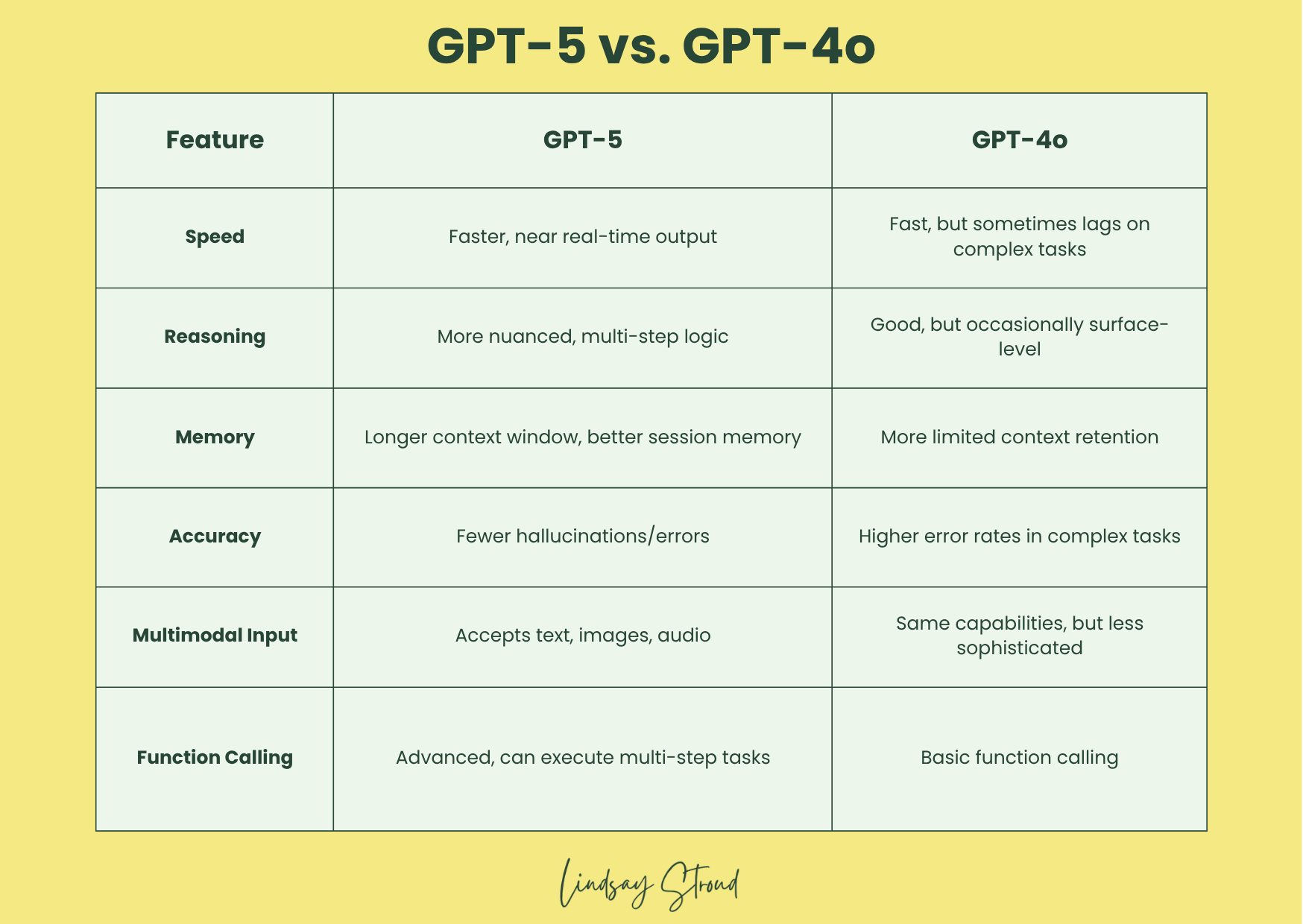GPT-5 for Hospitality Marketing: How Hotels and STRs Can Drive More Bookings with AI
9 minute read ⏱️ | 2,100 words 📖
Table of Contents
GPT-5 for hospitality marketing signals a new era in how hotels and short-term rentals (STRs) connect with guests and boost bookings. OpenAI’s GPT-5 is officially live, and it’s not just faster; it’s smarter, more capable, and way better at complex tasks. From whipping up apps based on simple prompts to generating research briefs with fewer errors, GPT-5 is a game changer.
For anyone working in hospitality or short-term rental marketing, understanding GPT-5 use cases in hospitality means unlocking powerful new tools to streamline your workflow and deliver better guest experiences.
In this comprehensive guide, I’ll break down what GPT-5 is and how it’s different from previous models. Whether you're looking to scale content creation or personalize guest communications, you'll find actionable insights that work for both hotel marketing teams and STR operators.
You’ll also receive:
8 copy-paste prompts for immediate implementation.
Practical strategies for content calendars and guest automation.
5 strategic questions to help guide your GPT-5 integration.
This article is part of my broader hospitality marketing tech series, focused on AI-powered strategies that help hotels lead the way, while also offering practical insights for short-term rental operators looking to scale smarter.
(For a deep dive into marketing technology designed specifically for short-term rentals, visit my Short-Term Rental Marketing & Tech hub.)
What's New in GPT-5?
At it's core, GPT-5 is OpenAI’s newest large language model (LLM). If you’ve heard of ChatGPT or GPT-4o, GPT-5 takes things to the next level. It’s what OpenAI calls a unified system, capable of deeper reasoning and ability to process multi-modal inputs like text, images, and audio. Plus, it responds faster than before.
This means GPT-5 doesn't just generate text; it actually understands context better, remembers longer conversations or documents, and tackles complicated requests with less guesswork.
For hospitality marketers, this upgrade translates to smarter AI-powered tools that boost productivity and improve content quality.
Comparing GPT-5, GPT-5 Mini, and GPT-5 Nano
Currently, OpenAI offers three GPT-5 versions to fit different needs and use cases:
GPT-5: The smartest and most powerful, perfect for complex reasoning, nuanced content, and multi-step workflows.
GPT-5 Mini: A more balanced option that's faster and efficient, great for everyday content tasks.
GPT-5 Nano: The quickest and leanest, designed for rapid responses and lightweight tasks.
Each version supports advanced tool calling, so you can plug GPT-5’s capabilities right into your marketing tech stack, whether you prioritize depth, speed, or efficiency.
GPT-5 vs. GPT-4o: What’s Changed?
At a high level, GPT-5 builds on GPT-4o’s foundation but incorporates several important upgrades into the fold. It’s faster and can handle near real-time responses even with complex tasks. Its reasoning is more nuanced, enabling better multi-step logic, while its memory can hold longer conversations and more context without losing track. GPT-5 also makes fewer errors, known as hallucinations, which means less time spent fact-checking and fixing content.
While GPT-4o supports multimodal input like images and audio, GPT-5 takes this a step further with more sophisticated understanding and execution, including advanced function calling that lets it complete multi-step tasks seamlessly.
For you, that means faster, more consistent content with less time spent fixing AI mistakes.
Quick Feature Comparison Table
Understanding the difference helps you see why GPT-5 is worth integrating now. Here’s a quick comparison table:
This translates into content that feels more consistent across channels, faster turnaround times, and less time spent fixing AI errors or rewriting outputs.
Why GPT-5 Matters for Hospitality and STR Marketing
Marketing in hospitality and short-term rentals is a balancing act. You’re juggling diverse guest profiles, like families, business travelers, vacationers, and digital nomads, each with different preferences. Your marketing must be relevant, timely, and engaging across emails, social, blogs, and more.
Yet, your team likely isn't growing as fast as these demands. Plus, content creation can eat up precious time and energy. That’s where GPT-5 marketing strategies for short-term rentals and AI content generation for hotels comes in. GPT-5 doesn't replace your team; it gives you a turbo boost, helping you produce personalized content faster and test messaging more effectively.
Hostaway's 2024 Short-Term Rental Report shows AI adoption grew 10% year-over-year, with 65% of property managers (11+ units) using AI last year. In other words, GPT-5 can help you stay competitive by scaling content personalization and streamlining guest experiences, without extra effort.
What’s Happening to Older GPT Models?
With all the buzz around GPT-5 and its new features, you might be wondering what’s going on with older models, like GPT-4o. Recently, users noticed that OpenAI abruptly removed all other models from the ChatGPT model picker, pushing everyone toward the new, unified GPT-5 experience. This sudden shift caused quite a stir, with some users pushing back for the return of older options. In the wake of this backlash, OpenAI has since brought back GPT-4o, given the obvious user demand.
While it’s common for legacy models to stick around for a while to support existing users, these kinds of abrupt retirements show how quickly AI evolves, and how important it is to keep up. For hospitality and short-term rental businesses, this means updating your AI tools to leverage GPT-5’s improved speed, accuracy, and capabilities.
Staying on top of these changes ensures your business stays competitive and ready to make the most of the latest AI innovations.
8 GPT-5 Use Cases in Hospitality Marketing (+ Prompts)
As impressive as GPT-5’s tech specs are, here’s the real question: how can you actually use it day to day? Whether you’re creating campaigns, managing guest messaging, or planning your content calendar, here are eight GPT-5 use cases for hospitality to get you started:
1. Build Full Content Calendars in Minutes
Spend less time brainstorming topics and scheduling posts. GPT-5 can generate detailed 3-month content plans for blogs, social media posts, and emails, each tailored to your audience and brand.
Prompt:
“Create a 3-month content calendar for a boutique hotel targeting millennial business travelers and eco-conscious tourists.”
2. Develop Detailed Guest Personas
Plug in your customer reviews, booking data, or survey results and GPT-5 will identify key guest personas, preferences, pain points, and booking habits, sharpening your marketing focus.
Prompt:
“Summarize guest personas from these 100 reviews, highlighting common preferences and concerns.”
3. Draft SEO-Optimized Blog Posts That Rank
GPT-5 understands search intent better, so your blog posts can naturally include keywords without sounding robotic.
Prompt:
“Write a 1,500-word SEO blog post on sustainable tourism trends, with recent stats and examples for boutique hotels.”
4. Write and Test Marketing Copy for Different Segments
Consumers increasingly value personalized experiences, with 42% willing to pay more for a friendly, welcoming interaction. GPT-5 can create and A/B test different email subject lines or promo copy for different guest segments, from families to solo travelers.
Prompt:
“Generate five email subject lines promoting a beachfront STR property to digital nomads.”
5. Automate Personalized Guest Communication
From pre-arrival messages to thank-you notes, GPT-5 drafts authentic, tailored guest messages fast, freeing your team from repetitive writing. For vacation rental operators, this kind of guest communication automation can be a true game changer.
Prompt:
“Write a friendly late check-in message including local dining recommendations.”
6. Summarize Competitor Reviews and Research Quickly
Feed GPT-5 OTA reviews or competitor info and get concise summaries highlighting strengths and weaknesses, saving you hours.
Prompt:
“Summarize common complaints and praise from OTA reviews of [insert competitor hotel].”
7. Brainstorm Campaign Concepts and Email Sequences Fast
Stuck on ideas? GPT-5 generates creative campaign themes and multi-email sequences to nurture leads and boost bookings.
Prompt:
“Create a five-email sequence promoting early bird summer packages for a mountain lodge.”
8. Deliver Hyper-Personalized Offers
By analyzing guest data, GPT-5 creates targeted promotions and messaging that improve satisfaction and loyalty through GPT-5-driven personalization for guest experience.
Prompt:
”Create 3 hyper-personalized hotel offers with subject lines and CTAs based on this guest data: [insert guest booking history, preferences, demographics, loyalty status, and behavioral patterns]."
5 Tips for Getting the Most Out of GPT-5
AI is a powerful teammate, but it’s not magic. The results you get depend on how you work with it. Here are five quick tips to ensure GPT-5 works for you, not against you:
1. Be clear and specific with your prompts. Vague requests equal vague answers. Instead of “Write a blog,” say something like, “Write a 1,500-word blog on sustainable tourism trends, including recent stats and examples for boutique hotels.” The more detail you give, the better the output.
2. Ask it to check in before going full throttle. For bigger projects like content calendars or email sequences, get GPT-5 to outline its plan first. That way, you steer it early instead of fixing a whole mess later.
3. Treat its first draft like a rough sketch, not the final painting. GPT-5 is a brilliant starting point, but it rarely nails it on the first try. Expect to edit, refine, and add your own flair. As I like to say to my clients, it's your appetizer and dessert, not your entree.
4. Double-check any facts or data it gives you. Sometimes AI gets creative with information that’s not quite right. Cross-check before you trust or publish.
5. Feed it examples of your own content. This helps GPT-5 match your brand voice and style better, saving you editing time and keeping your messaging consistent.
Follow these tips and GPT-5 will be less of a wild card and more your content sidekick.
5 Key Questions to Ask About Upgrading to GPT-5
With GPT-5 rolling out, there's never been a better time to check in with yourself and your team. Make the most of this new AI era by answering these 5 crucial questions to maximize your hospitality marketing efforts:
Are my current AI tools fully leveraging GPT-5’s capabilities?
Just switching versions isn’t enough. Are your tools optimized to use GPT-5’s deeper reasoning, speed, and multimodal inputs?
What specific marketing tasks could benefit most from GPT-5’s improvements?
Think about starting small with content calendars, guest communications, or email copy, areas where the impact is clear and manageable.
How comfortable is my team with experimenting and iterating on AI outputs?
GPT-5 is powerful, but there’s still a learning curve. Is your team ready and able to review, refine, and tailor its suggestions without getting overwhelmed?
Do I have processes in place to fact-check AI-generated content?
Even GPT-5 can get details wrong sometimes. Fact-checking remains critical to maintain your brand’s credibility.
How can I integrate GPT-5 into existing workflows to score quick wins?
Look for easy wins first to build confidence and momentum before expanding AI use across your marketing operations.
Answering these will help you move from passively upgrading to actively using GPT-5 to your advantage.
Prepare Your Hotel or STR Business for GPT-5
The future of hospitality marketing blends human creativity with AI efficiency. GPT-5 for hospitality marketing frees you from repetitive work and gives you time to focus on storytelling and genuine guest connections. If you want to boost your bookings and online presence, integrating GPT-5 SEO optimization for hospitality websites should be part of your strategy. For a more tailored approach to vacation rentals, check out my Short-Term Rental Marketing Tech content hub.
Not sure where to start? I help hospitality and short-term rental brands simplify content production, reach the right guests, and scale smarter, whether that means tapping into GPT-5 or fine-tuning your current marketing workflows.
Book your free 30-minute touchpoint and let’s unlock your team’s potential together.
Frequently Asked Questions
How much does GPT-5 cost for hospitality marketing?
OpenAI offers GPT-5 in a few versions with different price points. The smallest plan, GPT-5 Nano, is super affordable and great for simple tasks like guest messaging. The full GPT-5, which handles the heavy lifting like complex content and personalization, costs a bit more, around fractions of a cent per 1,000 words. So, there’s an option for every budget and need.
Is GPT-5 a fit for small hotels and short-term rentals?
Absolutely. Start small with the lighter versions to automate emails or social posts, then scale up as your marketing grows. It’s flexible and accessible for any size business.
When can I expect to see results after using GPT-5?
Some marketers notice improvements within weeks, with faster content creation and guest messages that connect better. The more you customize and refine, the better the impact.
Is GPT-5 hard to plug into my existing marketing tools?
Not really. GPT-5 is designed to work with lots of platforms through advanced integrations. You might want to get your tech team involved or work with an AI-savvy partner to make sure it fits smoothly into your setup.
What sets GPT-5 apart from previous AI tools for hospitality?
It’s faster, smarter, remembers more context, and handles complex tasks better, delivering natural, personalized content. This means less time fixing errors and more time connecting with guests.






